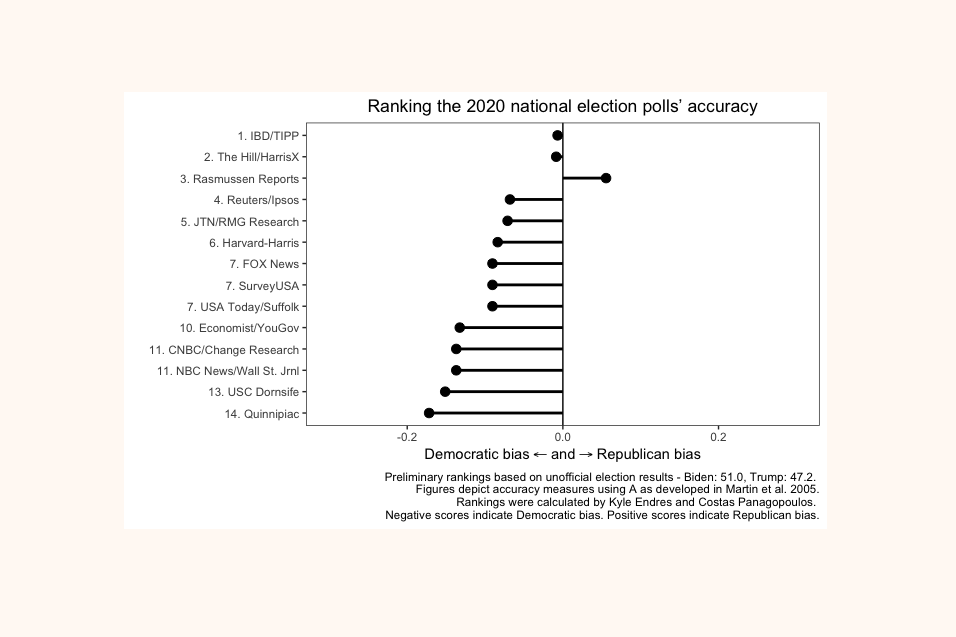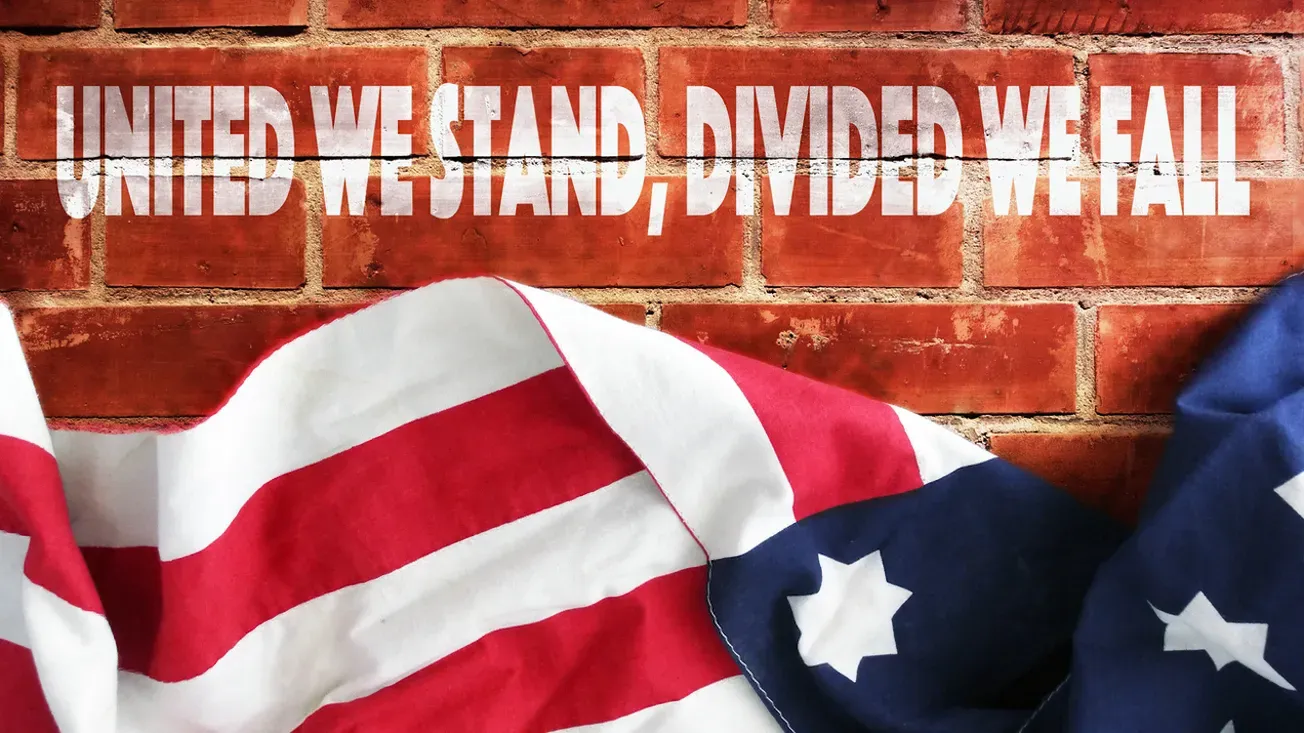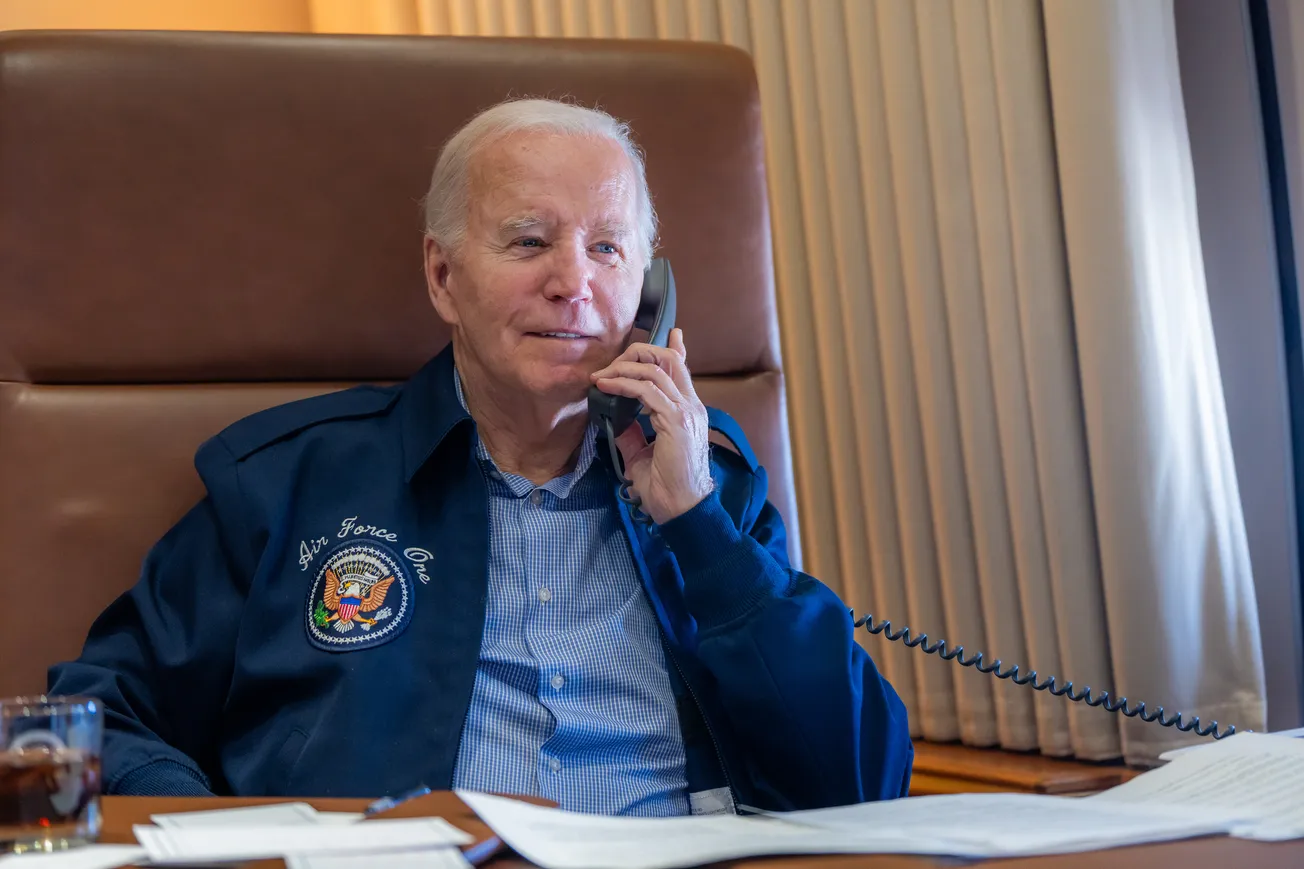We live in divisive times, it seems. Bitter rhetoric and open rage over political events, ideologies and culture have become common. As a result, our country's inhabitants now admit we are no longer unified, as the latest I&I/TIPP data clearly show.
I&I/TIPP asked voters this month (and every month since April 2021), "in general, would you say the United States is" followed by four possible answers: "very united," "somewhat united," "somewhat divided," "very divided," and "not sure."
The answers are somewhat dispiriting for those hoping for a whiff of unity during the holiday season: More than 2/3 of respondents (69%) said we were either very divided (40%) or somewhat divided (29%). Just 3% were not sure. Only 28% overall said they believed Americans were either "very" united (14%) or "somewhat" united (14%).
Still, there remain some pockets of unity optimism in the national online poll of 1,400 people, taken from Nov. 1-3. The poll has a margin of error of +/-2.7 percentage points.
Democrats, for instance, split evenly at 49% united versus 49% divided. Republicans are far more glum, with 21% answering united, compared to 77% divided. Independents see even more division, with only 15% responding united and 80% divided.
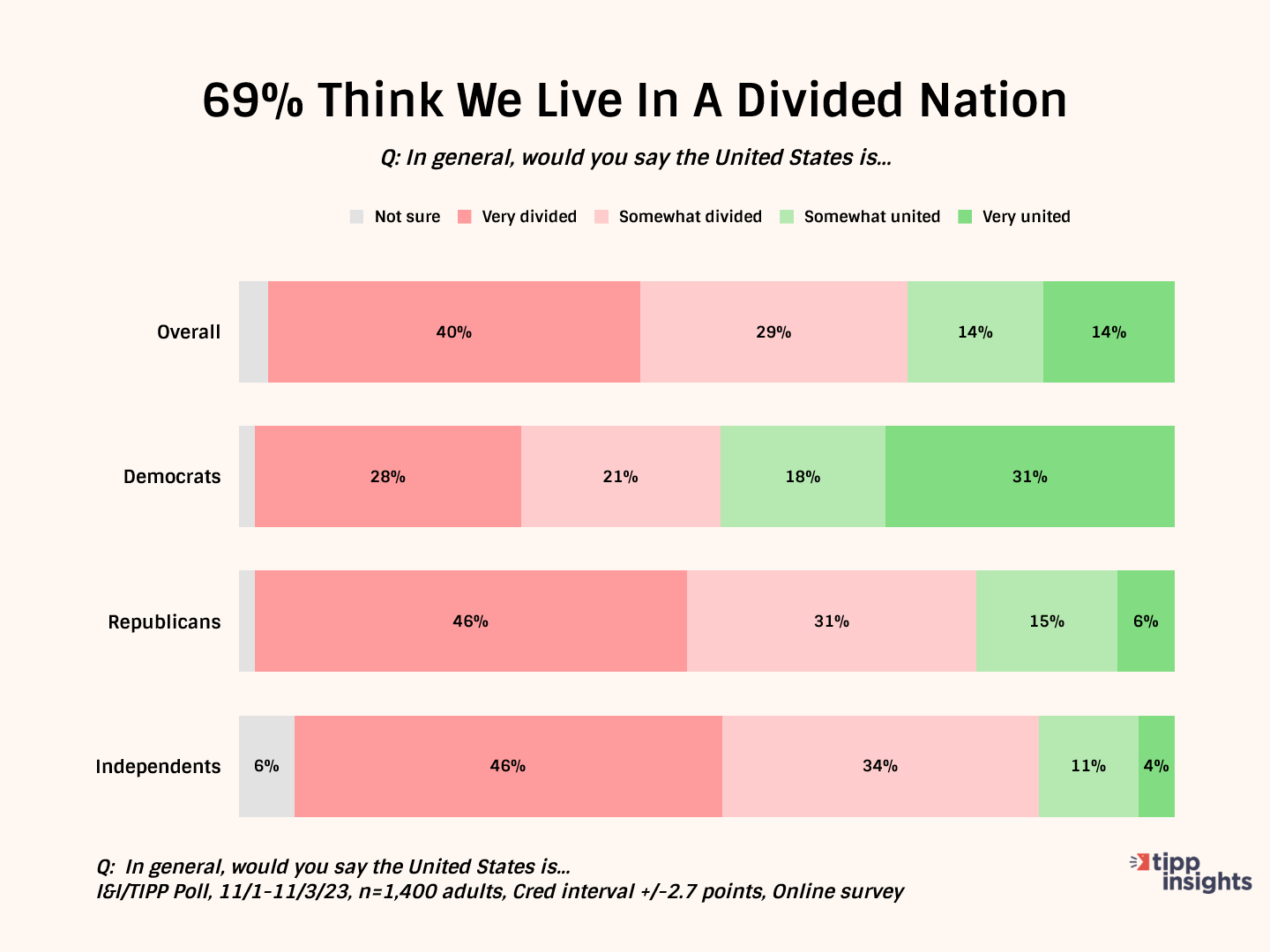
This wasn't the only big gap among the 36 demographic groups I&I/TIPP follows each month.
For example, urban voters see more unity (50%) and less division (48%) than either those who live in the suburbs (16% united, 81% divided) or rural areas (21% united, 75% divided). So unity's pretty much a city thing.
Race and ethnicity also reveal differences. Whites (22% united, 75% divided) are not too far from blacks (32% united, 64% divided) in how they view America's polity today. But Hispanics are far more optimistic, with 53% saying America was united, over 45% saying divided.
Age, too, is a dividing point for this question. Those in the 25-44 year-old age group, representing the prime working years for most, were two to three times more likely to answer "united" (47%) over "divided" (50%) than the other age groups of 18-24, 45-64 and 65 and over.
There's an economic component, as well: Those with the top incomes, earning more than $70,000 a year, are far more likely to feel America is united: 52% united, to 47% divided. The arithmetic average for the other three income groups is 18% united, 79% divided.
So, in short, Americans are even divided about being divided. Which may not be so surprising given the damaged nature of public discourse in this age of "cancelling" unpopular speech and "deplatforming" those with whom we disagree.
How do these numbers compare with previous ones? I&I/TIPP also produces a Unity Index, which allows someone to compare one month's results with other months with an apples-to-apples comparison.
In October, the Unity Index hit an all-time low of 25.6, well below the 39.5 high set in July 2021, four months after the index began. However, it rebounded sharply in November to 33.1, its highest level since last April. The rise was fueled by strong gains in the South (up 48% to 41.1), and among those aged 25-44 (up 58% to 50), men (up 47% to 41.5), Hispanics (up 59% to 55), Democrats (up 54% to 50.3), urban dwellers (up 58% to 51.6), self-described conservatives (up 35% to 34.4) and liberals (up 62% to 43).
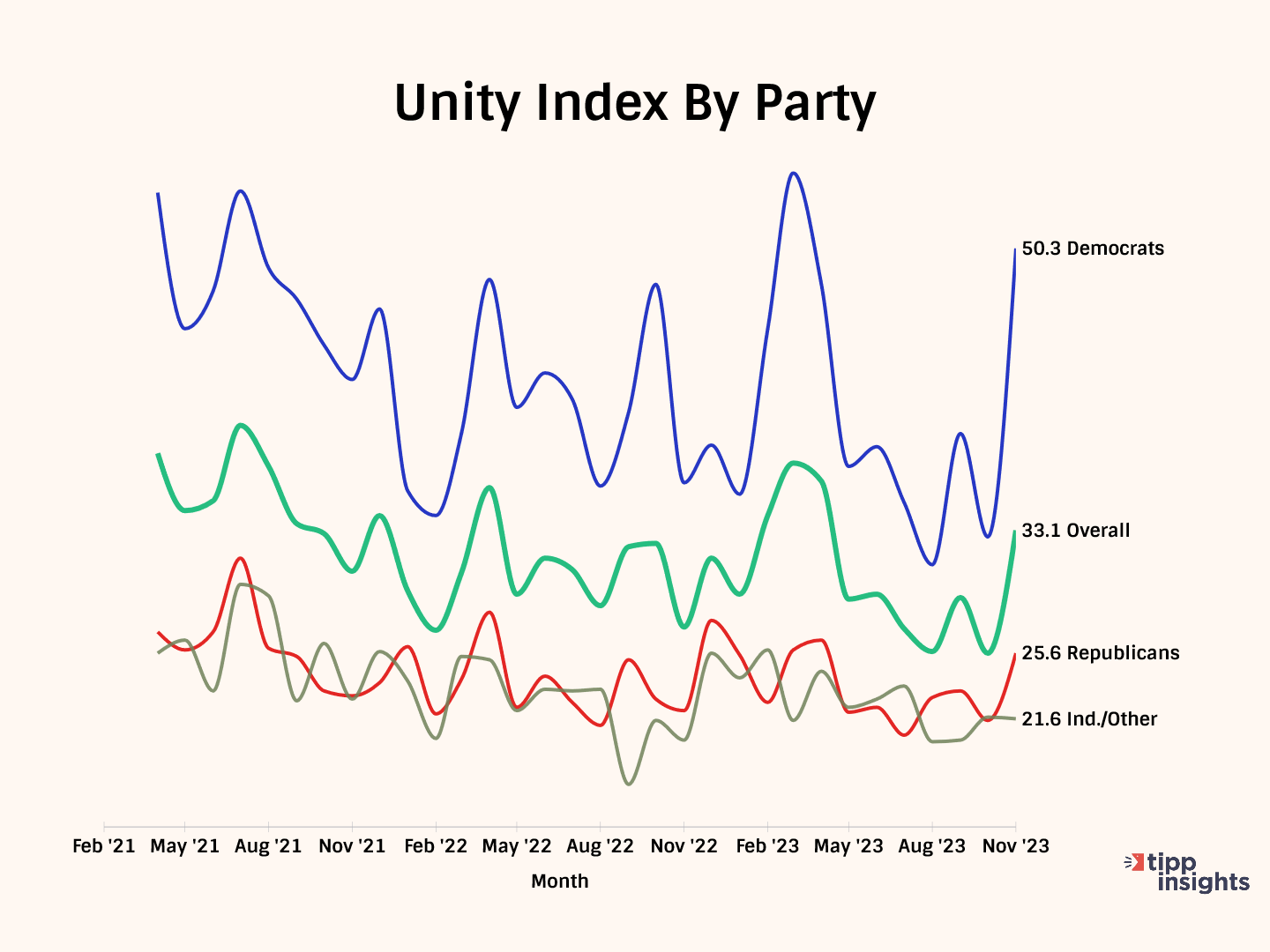
It's perhaps not surprising that politicians often talk out of both sides of their mouths when it comes to encouraging "unity" over "division."
In recent televised comments made during a call to the Macy's Thanksgiving Day Parade, President Joe Biden called on Americans to come together in a spirit of unity:
“We have to remind ourselves how blessed we are to live in the greatest nation on the face of the earth. Today is about coming together, giving thanks for this country we call home. And thanks to all the firefighters, police officers, first responders and our troops, some of whom are stationed abroad.”
“We can have different political views, but … we have one view — the one view is we’re the finest, greatest nation in the world. We should focus on that … We have to bring the nation together and we have to treat each other with a little bit of decency and so — and I think that’s who the vast majority of the American people are.”
Which are fine sentiments, as most would almost certainly agree. But also on Thanksgiving, Hot Air's Karen Townsend reports, the Biden-Harris campaign sent out a glossy tweet providing Americans with "Your handy guide for responding to crazy MAGA nonsense this Thanksgiving."
That's the sort of mixed message Americans now routinely see on the topic of "unity." These days, it seems, it's not enough merely to disagree with someone on a policy or to reject a message; you must also repudiate the people who bear the message, utterly and entirely.
Americans see this daily in their workplaces, on social media, and on the streets of their communities. Sadly, the political left seems to have made this a key part of its political strategy: Demonize those who disagree, and make those who have doubts remain silent.
As a result, many now feel as if they are being systematically excluded from America's bounty by a system that no longer rewards people for what they do, but for racial, ethnic or religious identity. The lack of unity might also have economic roots, as discontent with the perceived failure of Bidenomics grows.
A Wall Street Journal/NORC poll recently found only 36% of those surveyed said "the American dream still holds true, substantially fewer than the 53% who said so in 2012 and 48% in 2016 in similar surveys of adults by another pollster. When a Wall Street Journal poll last year asked whether people who work hard were likely to get ahead in this country, some 68% said yes—nearly twice the share as in the new poll."
That's a big reason for Americans' disgruntlement, and their lack of a feeling of "unity" with their fellow Americans. It's made worse by what blogger/law professor Ann Althouse notes is a sense of "permacrisis," which she calls "a political strategy to make people feel that we are always in special dire circumstances, justifying unusual emergency measures, and warranting the sacrifice of our personal pleasure and freedom."
It's made worse by the left-leaning media and think tanks continually calling former President Donald Trump's supporters and those on the conservative side of the spectrum "a threat to our democracy." What unity can come from that?
Here in the U.S., when you feel you're systematically excluded from public debate, or that your hard work is no longer rewarded, or that the world around you is a perpetual crisis, a feeling of unity may be the first casualty, as recent trends in the I&I/TIPP Poll's Unity Index suggest.
I&I/TIPP publishes timely, unique, and informative data each month on topics of public interest. TIPP’s reputation for polling excellence comes from being the most accurate pollster for the past five presidential elections.
Terry Jones is an editor of Issues & Insights. His four decades of journalism experience include serving as national issues editor, economics editor, and editorial page editor for Investor’s Business Daily.
We could use your help. Support our independent journalism with your paid subscription to keep our mission going.
Our performance in 2020 for accuracy as rated by Washington Post:
